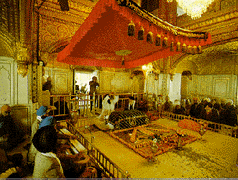![]()
|
The Golden Temple A lady doing parikrama around the Temple
The construction of the temple was completed by Guru Arjun Dev, the son and successor of Guru Ramdas, in late sixteenth century. It was rebuilt by the Sikh ruler, Maharaja Ranjit Singh in 1803. The Golden Temple is a two storey marble structure, with an imposing dome of pure gold. The architecture of the Golden Temple, is a blend of Hindu and Muslim styles. The golden dome is meant to represent an inverted lotus flower. The interior of the temple is decorated with semi precious stones, frescoes and glass work. The Akal Takht, or immortal throne, established by the sixth Sikh Guru, Guru Hargobind, is the supreme seat of Sikh religious authority, and is also the repository of ancient weapons, used by the Sikh warriors and Gurus. The original copy of the Granth Sahib, which is kept in the Golden Temple during the day, is ceremoniously returned to the Akal Takht, at night. The temple interior
The gnarled old Jubi Tree in the north west corner of the compound, is believed to possess special powers. It was planted 450 years ago, by the Golden Temple's first high priest, Baba Buddhaya. Guru-ka-Langar or the communal canteen, is towards the eastern entrance of the temple complex, and it provides free food to all visitors, regardless of colour, creed, caste or gender. Pilgrims and visitors to the Golden Temple, must remove their shoes and cover their heads, before entering the temple premises. The best time to visit the temple is early in the morning, on weekdays, before it gets crowded. Other places to visit Near the Golden Temple, is Jallianwala Bagh, a poignant memorial of the Freedom Movement. This garden was the site of a brutal massacre of over 2000 innocent unarmed people, on the orders of a British General on April 13, 1919. The bullet scarred walls of the well kept garden, today, enclose a memorial with an eternal flame, dedicated to the martyrs. Durgiana Temple, outside the Lohagarh gate of the old city, is dedicated to Goddess Durga, and is a centre of pilgrimage for devout Hindus. Other attractions are Ram Bagh Garden, encircling the palace of the Sikh ruler Ranjit Singh; Fort Gobind Garh, which was built by Ranjit Singh in 1805-09; Baba Atal Rai Tower; Baba Bakale, a gurudwara dedicated to Tegh Bahadur, the ninth Guru of Sikhs and Taran Taran, a gurudwara in the memory of Guru Ram Das. When to visit The best time to visit Amritsar is between October and March. How to get there Amritsar is connected to all the important places in the country by air, rail or road. There is a daily return flight between Delhi-Amritsar/Chandigarh -Delhi. Where to stay Amritsar has a wide variety of accommodation options available. Some good hotels of Amritsar include, Mohan International Hotel (Tel: +91-183-227801-8, Fax: 226520), Ritz Hotel (Tel: 226606, Fax: 226657) and Hotel Airlines( Tel: 227738). |
News | Culture | Economy | Sports | Tourism | Polity | Magazine | Info
Media | Science & Tech. | Social Issues | Foreign Relations | States
What's New | Search | Home
 The
globally renown Golden Temple, Harmandir Sahib, which enshrines the Holy
Book of the Sikhs, the Guru Granth Sahib, is located in Amritsar. Amritsar,
literally 'a pool of nectar', was founded by the fourth Guru of Sikhs,
Guru Ram Das, who had initially constructed a pool here. The vital nucleus
of Sikhism, Amritsar is also believed to be the site, where Sage Valmiki
wrote the epic, Ramayana. According to popular belief, Rama and Sita had
spent a brief period of their 14 year exile here.
The
globally renown Golden Temple, Harmandir Sahib, which enshrines the Holy
Book of the Sikhs, the Guru Granth Sahib, is located in Amritsar. Amritsar,
literally 'a pool of nectar', was founded by the fourth Guru of Sikhs,
Guru Ram Das, who had initially constructed a pool here. The vital nucleus
of Sikhism, Amritsar is also believed to be the site, where Sage Valmiki
wrote the epic, Ramayana. According to popular belief, Rama and Sita had
spent a brief period of their 14 year exile here. 